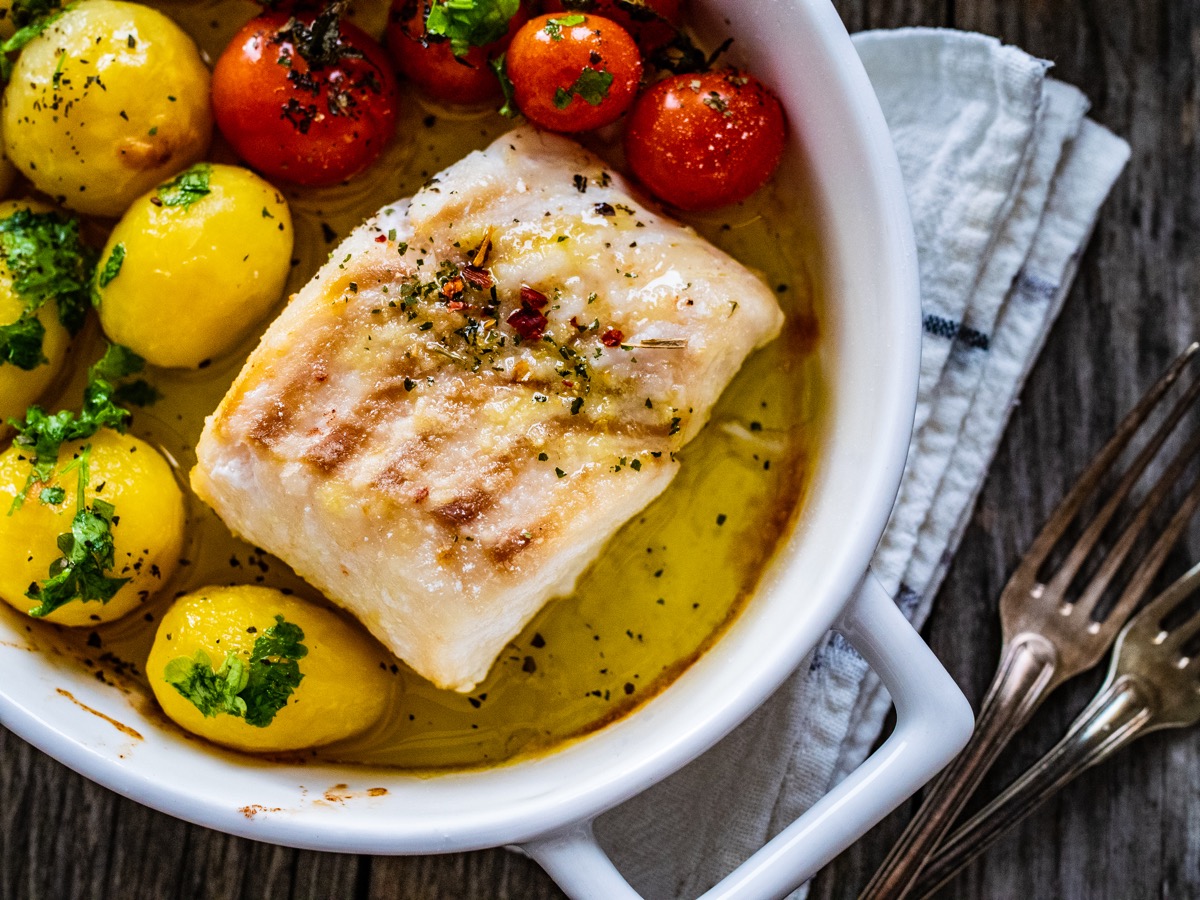Cutting Down on Salt Could Be Hurting Your Thyroid—How to Fix the Damage, Doctors Say

Your thyroid is a small, butterfly-shaped gland located in the front of your neck. As an essential part of the endocrine system, it secretes hormones that help control your metabolism, growth, weight, energy levels, cognitive function, and more. Of course, for most people, the normal functions of the thyroid go unnoticed when things are running smoothly—it’s only when you develop a problem with your thyroid health that you become acutely aware of its many responsibilities.
According to the American Thyroid Association (ATA), roughly 20 million Americans suffer from some form of thyroid disease (though 60 percent of those people are unaware that they have a problem). Experts say that you are more likely to develop a thyroid condition if you fail to get enough iodine, a mineral found in your diet. Since salt is one of the most common sources of iodine, low-sodium diets may trigger thyroid problems in some people, they warn.
The good news? Doctors say you can still reap the bountiful benefits of a low-salt diet without putting yourself at risk. Here’s everything you need to know about cutting down on salt without triggering a thyroid problem—and how to help fix any damage you’ve already done.
RELATED: FDA Warns Common Soda Ingredient Is Toxic to Your Thyroid.
Low-salt diets provide a wide range of health benefits.

It’s hard to overstate how beneficial a low-sodium diet can be for your heart health—especially if you’re at high risk for cardiac conditions. S. Adam Ramin, MD, a board-certified urologist and medical director of Urology Cancer Specialists in Los Angeles, tells Best Life how too much sodium can wreak havoc on your body.
“The problem is that when you eat too much salt, the kidneys respond by retaining water in order to dilute it,” Ramin explains. “This is a protective measure that helps balance the chemical levels of the bloodstream, which is required to keep our hearts in working order. Over time, placing this much stress on the kidneys can cause damage to them and to the heart muscle.”
A high-sodium diet can also increase your risk of a range of other ailments. “The primary health effect associated with diets high in sodium is raised blood pressure, increasing the risk of cardiovascular diseases, gastric cancer, obesity, osteoporosis, Meniere’s disease, and kidney disease,” notes the World Health Organization (WHO).
RELATED: The 5 Most Popular Diets in the U.S.—And Which One Is Most Effective.
However, a low-sodium diet could potentially harm your thyroid.

Though a lack of sodium will not in itself harm your thyroid, cutting out salt means cutting out a significant source of iodine—and that could have a negative effect. In particular, low iodine levels can cause hypothyroidism, otherwise known as underactive thyroid. This is when the thyroid is unable to make enough thyroid hormone to meet your body’s needs.
Older adults may be at especially high risk of iodine deficiency, research suggests. A recent study published in the Journal of Nutritional Health and Food Science found that among a group of 189 women between the ages of 51 and 86, 60 percent were moderately deficient in iodine.
RELATED: People Who Live to 100 Have These 3 Things in Common, New Research Shows.
You can still have an iodine-rich diet without the added salt.

If you’d like to reduce your sodium intake without lowering your iodine levels, there are several ways to get iodine through other areas of your diet. This may also help repair thyroid damage that’s already occurred, though it’s important to consult with your doctor to find out if you also require medication or other interventions.
“There are many sources of iodine, such as fish, seafood, dairy, eggs, enriched grain products such as cereals, fruits, and vegetables—many of which are higher in iodine than iodized salt,” explains Chrissy Arsenault, RDN, MBA, a registered dietitian at Trainer Academy. She recommends eating cod, tuna, shrimp, eggs, cheese, yogurt, and milk, which she says are rich in the mineral.
Those looking to follow a low-salt diet may also benefit from consulting this low-sodium shopping list from the U.S. Department of Health and Human Services, or this low-sodium recipe list published by the Mayo Clinic.
RELATED: 7 Surprising Benefits of Taking Magnesium Every Day.
People on plant-based diets must work extra hard to get enough iodine.

Vegans, vegetarians, and people on largely plant-based diets who also restrict their sodium levels may struggle more than others to get enough iodine through their diets.
“Iodine content in food of plant origin is lower in comparison with that of animal origin due to a low iodine concentration in soil,” explains a 2003 study in the journal Annals of Nutrition and Metabolism.
However, seaweed and nori are excellent plant-based sources of iodine, and to a lesser extent, so are beans and prunes. Iodine supplements can further help you increase your levels.
In total, most adults should aim to get 150 mcg of iodine daily. Speak with a doctor or nutritionist if you eat a plant-based diet to ensure that you’re getting enough iodine to support healthy thyroid function.
For more health news sent directly to your inbox, sign up for our daily newsletter.
Best Life offers the most up-to-date information from top experts, new research, and health agencies, but our content is not meant to be a substitute for professional guidance. When it comes to the medication you’re taking or any other health questions you have, always consult your healthcare provider directly.
- Source: https://www.thyroid.org/media-main/press-room/
- Source: https://www.who.int/news-room/fact-sheets/detail/salt-reduction
- Source: https://symbiosisonlinepublishing.com/nutritionalhealth-foodscience/nutritionalhealth-foodscience89.php
- Source: https://health.gov/myhealthfinder/health-conditions/heart-health/lower-sodium-foods-shopping-list
- Source: https://www.mayoclinic.org/healthy-lifestyle/recipes/low-sodium-recipes/rcs-20077197
- Source: https://pubmed.ncbi.nlm.nih.gov/12748410/